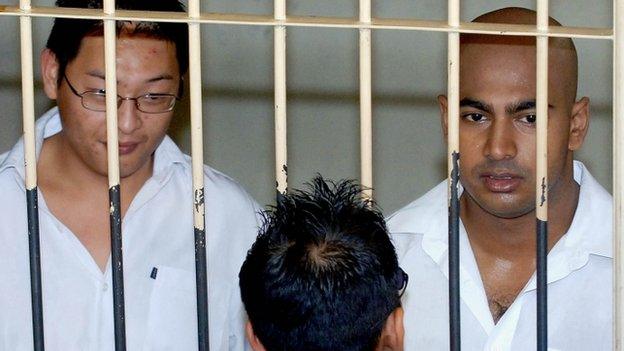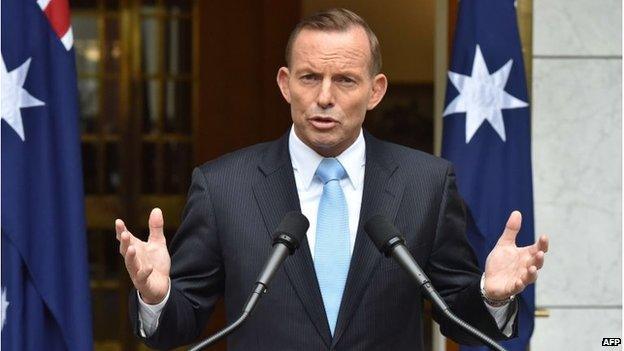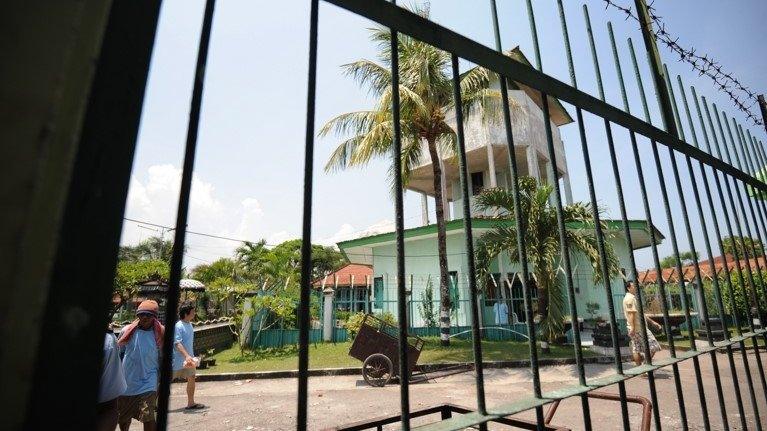Abbott cites 'legal options' amid Bali Nine corruption claims
- Published

Andrew Chan, left, and Myuran Sukumaran were sentenced to death in 2006
Australian Prime Minster Tony Abbott has said there are still "legal options available" in the case of two Australians on death row in Indonesia.
Andrew Chan and Myuran Sukumaran were convicted of drug crimes in 2006 and could be executed within days.
Media reports on Monday said the men's lawyers had written to the Indonesian judiciary alleging judges had asked for bribes for lighter sentences.
Indonesia's judicial officials have not publicly commented on the claim.
Chan and Sukumaran, along with seven other Australians, were arrested in Bali in 2005 for trying to smuggle more than 18lb (8.3kg) of heroin from Indonesia to Australia.
The pair were later found to be the ringleaders of the group and sentenced to death. The two Australians lost a final legal bid to have their cases reviewed earlier this month.
Australia's top politicians have been actively campaigning for clemency for the two.
The other seven members of the "Bali Nine" are currently serving either life or 20 years in prison.
'Serious allegations'
The Indonesian defence lawyers' letter alleges that the six judges in the trial in Bali had offered lighter sentences in exchange for money, according to Australia's Sydney Morning Herald and Herald Sun newspapers.
The judges were pressured from "certain parts" to hand down the death penalty, said the reports.

PM Tony Abbott and other top politicians have repeatedly appealed on behalf of the condemned men
The letter claims that the judges therefore had breached ethical standards.
Speaking to reporters on Monday morning, Mr Abbott declined to comment directly on the allegations but said the Australian government was still making representations to Indonesia about the planned executions.
"What we understand is that there are still legal options open to these two Australians and their legal teams," he said, adding that until those options were exhausted Indonesia should not execute the two men.
Foreign Minister Julie Bishop would also not comment on the letter, but said there were some "very serious allegations and I understand that the lawyers for Mr Sukumaran and Mr Chan will continue to raise these matters".
She urged the Indonesians to follow all appeals processes, but said she had to respect its legal systems.
A Lowy Institute poll, external conducted over the weekend found that 62% of Australians opposed the executions of Chan and Sukumaran.
The poll of 1,211 randomly selected respondents also found that 69% thought the death penalty should not be applied to drug traffickers.
Indonesian officials had cited as support for their actions an earlier poll conducted for an Australian radio station that appeared to show a slim majority backed executing drug traffickers. However the methodology behind that survey had been criticised.
Indonesia has some of the toughest drug laws in the world and ended a four-year moratorium on executions in 2013.
New President Joko Widodo supports capital punishment for drug crimes. Last month, Indonesia executed convicts from Malawi, Nigeria, Vietnam, Brazil and the Netherlands as well as one from Indonesia.
It prompted Brazil and the Netherlands to recall their ambassadors in protest. Australian authorities have threatened to do the same if Chan and Sukumaran are put to death.
- Published8 January 2015

- Published16 January 2015
